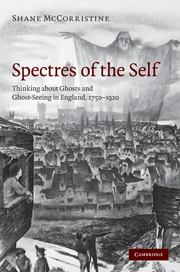2 - Seeing is believing: hallucinations and ghost-seeing
Published online by Cambridge University Press: 05 August 2012
Summary
The dreams of the Geistersehers: Kant and Schopenhauer on ghost-seeing
The works of Kant and Schopenhauer on ghost-seeing reflected a widespread interest in the investigation of occult phenomena within German philosophy which formed an intellectually rich prelude to the eruption of philosophical investigations into modern spiritualism, which began in the United States with the case of the Fox sisters in 1848. Their writings were significant in that they propounded theories of wakeful dreaming from a philosophical basis, analysing the supernatural phenomena considered widespread in Europe before the arrival of modern spiritualism in the 1850s, and thus before the establishment of sceptical and investigative modes of interaction with the ghostly. The occult phenomena being examined by philosophers, physicians and other curious parties in Germany included the phenomena of animal magnetism, second sight, angelic visitations and witchcraft – yet it was the writings of Swedenborg that initiated Kant's personal interest in such marvels. Kant was concerned that the spiritualist speculations of Swedenborg were proving influential within intellectual circles and he resolved to counter this perceived influence with some anti-spiritualist philosophical arguments.
Schopenhauer's essay on ghost-seeing can be seen as a continuation of the Kantian investigation into Swedenborgianism, yet Schopenhauer's own idealist philosophical system proved much more accommodating of the spirit-world than did Kant's early philosophical thought. As such, the essays of Kant and Schopenhauer offer contrary views of ghost-seeing from philosophically idealistic points of view which can be compared and contrasted with the spectral illusions theory of England in the early nineteenth century and the debates within French psychiatric circles as to whether the hallucination was normal or not.
- Type
- Chapter
- Information
- Spectres of the SelfThinking about Ghosts and Ghost-Seeing in England, 1750–1920, pp. 66 - 100Publisher: Cambridge University PressPrint publication year: 2010



